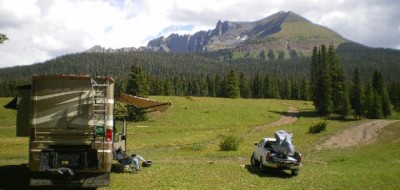
By Bob Difley
As recent events show, even though our food sources are likely among the most inspected and safest to eat on earth, pathogens do make it into foods available to us. While most of us are familiar with and have confidence in our local food suppliers, how and from whom do we pick our foods when on the road?
Unfortunately, we can’t always tell when foods contain something that will make us sick. Whether purchasing food from a major supermarket supplied by super-sized agribusiness producers or from the back of a farmer’s truck at a local farmers’ market doesn’t protect us from the pathogens that sneak through.
Boondockers must be especially careful in the handling and storing of fresh foods when stocking up before a trip, storing food in every available space—often hidden from view until discovered as the storage area empties out, often having been subjected to a wide fluctuation between heat and cold, and keeping foods beyond the safe date since we can’t just pop down to the market to replace questionable items—and we are often a distance from medical care if we do get sick.
We also might be a bit sparse in using wash and rinse water on dinnerware and cooking utensils because of our limited fresh water supply and waste tank capacity. So RVers, especially boondockers, should take extra precaution in food storage, food preparation, and clean up. Here are a few tips from food safety experts.
• USE PASTEURIZED EGGS If you are not willing to give up soft-boiled eggs or unbaked cookie dough, or you are using a recipe that calls for raw or partly cooked eggs. Better yet, don’t eat raw or partially cooked eggs.
• WASH ALL PRODUCE Even if you are going to peel the skin, give it a good scrub so you don’t transfer bacteria from the knife or peeler to the part you are going to eat. Most important, wash all lettuce, even if it comes in a bag that says triple washed.
• LEARN TO LOVE WELL DONE Cooking thoroughly is the best way to eliminate harmful bacteria from meats and poultry. Use a meat thermometer.
• THE RIGHT CUTTING BOARDS Always prepare raw meats and poultry on one cutting board, using another for vegetables. Clean both with warm soapy water after each use. Whether you use wood or plastic cutting boards, the important thing is to keep boards clean and replace them when they become scored because pathogens can hide in the grooves.
• UNDERSTAND ‘ORGANIC’ Organic means grown without pesticides, it has nothing to do with bacteria and other pathogens. However, there is something reassuring about buying from a small organic farmer at a local stand or farmers’ market. Even so, remember that you need to handle anything organic — meat, poultry, produce — the same as non-organic. You should still keep meats and vegetables separate to avoid cross-contamination, wash all produce thoroughly and wash platters and other surfaces that come into contact with raw meat and poultry.
• BE SMART ABOUT LEFTOVERS Keeping food too long can pose a risk. You can’t smell, see, or taste the bacteria that causes illness.
The Center for Science in the Public Intereste also points out:
• Don’t leave food out longer than two hours, and use or freeze all leftovers within four days.
• To avoid throwing out food (and wasting money), plan your trip’s menu and shopping list with leftovers in mind, i.e. roast chicken one day, chicken salad sandwiches the next, to make sure leftovers get used quickly.
• Finally, since many of us fit the definition of “elderly” (even if we disagree with it), the Center says, “The elderly are often likely to keep food too long. But they are more at risk of getting seriously ill from tainted food.”
For more RVing and boondocking tips, visit my Healthy RV Lifestyle website and also check out my ebooks, BOONDOCKING: Finding the Perfect Campsite on America’s Public Lands, Snowbird Guide to Boondocking in the Southwestern Deserts, and 111 Ways to Get the Biggest Bang our of your RV Lifestyle Buck.


w6pea
Bob
Another informative article….I wonder if maybe we should use or dispose of some of the cans of food in our RV?
Velda Solomon
The following is now deemed incorrect information. Per a Cornell University study, if you wash pre-bagged lettuce, it then contains more bacteria from cross contamination in your own kitchen than it did straight from the bag. This was quoted today on America’s Test Kitchen. So they said, do not re-wash pre-washed lettuce.
• Most important, wash all lettuce, even if it comes in a bag that says triple washed.
charles
we keep some canned goods (soup, stew, beans) in the food loft as “emergency” rations. we usually take short trips 7-10 days or less) and leave the cans in the loft between trips. I don’t know how hot it gets in the stored rv in the shade- I’m guessing high 90’s-maybe more since parked cars get to 120.
How likely are the canned goods to spoil? thanks chuck